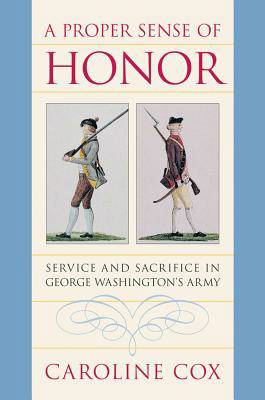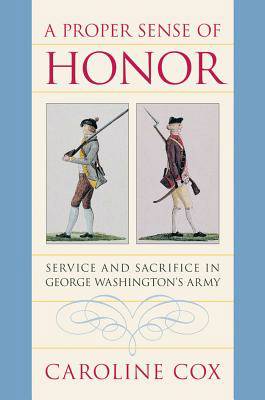
- Retrait gratuit dans votre magasin Club
- 7.000.000 titres dans notre catalogue
- Payer en toute sécurité
- Toujours un magasin près de chez vous
- Retrait gratuit dans votre magasin Club
- 7.000.0000 titres dans notre catalogue
- Payer en toute sécurité
- Toujours un magasin près de chez vous
A Proper Sense of Honor
Service and Sacrifice in George Washington's Army
Caroline Cox
Livre broché | Anglais
50,45 €
+ 100 points
Description
Starting with the decision by patriot leaders to create a corps of officers who were gentlemen and a body of soldiers who were not, Caroline Cox examines the great gap that existed in the conditions of service of soldiers and officers in the Continental army. She looks particularly at disparities between soldiers' and officers' living conditions, punishments, medical care, burial, and treatment as prisoners of war. Using pension records, memoirs, and contemporary correspondence, Cox illuminates not only the persistence of hierarchy in Revolutionary America but also the ways in which soldiers contested their low status.
Intriguingly, Cox notes that even as the army reinforced the lines of social hierarchy in many ways, it also united soldiers and officers by promoting similar conceptions of personal honor and the meaning of rank. In fact, she argues, the army fostered social mobility by encouraging ambitious men to separate themselves from the lowest levels of society and giving them the means to enact that separation. At a time when existing social arrangements were increasingly challenged by war and by political rhetoric that embraced the equal rights of men, Cox shows that change crept slowly into American military life.
Armies are the product of the societies that create them. In 1775, when patriot leaders formed the Continental army, they were informed by their own experiences and their knowledge of the British army. Thus, the Continental Congress created a corps of officers who were gentlemen and a body of soldiers who were not. Caroline Cox shows that, following this decision, a great gap existed in the conditions of service between soldiers and officers of the Continental army. Her study of daily military life, punishment and military justice, medical care and burial rituals illuminates the social world of the Continental army and shows how every aspect of life reinforced the distinctions of rank. At a time when existing social arrangements were increasingly challenged by war and political rhetoric that embraced the equal rights of men, Cox shows that change crept slowly into American military life.
Intriguingly, Cox notes that even as the army reinforced the lines of social hierarchy in many ways, it also united soldiers and officers by promoting similar conceptions of personal honor and the meaning of rank. In fact, she argues, the army fostered social mobility by encouraging ambitious men to separate themselves from the lowest levels of society and giving them the means to enact that separation. At a time when existing social arrangements were increasingly challenged by war and by political rhetoric that embraced the equal rights of men, Cox shows that change crept slowly into American military life.
Armies are the product of the societies that create them. In 1775, when patriot leaders formed the Continental army, they were informed by their own experiences and their knowledge of the British army. Thus, the Continental Congress created a corps of officers who were gentlemen and a body of soldiers who were not. Caroline Cox shows that, following this decision, a great gap existed in the conditions of service between soldiers and officers of the Continental army. Her study of daily military life, punishment and military justice, medical care and burial rituals illuminates the social world of the Continental army and shows how every aspect of life reinforced the distinctions of rank. At a time when existing social arrangements were increasingly challenged by war and political rhetoric that embraced the equal rights of men, Cox shows that change crept slowly into American military life.
Spécifications
Parties prenantes
- Auteur(s) :
- Editeur:
Contenu
- Nombre de pages :
- 368
- Langue:
- Anglais
Caractéristiques
- EAN:
- 9780807858615
- Date de parution :
- 27-08-07
- Format:
- Livre broché
- Format numérique:
- Trade paperback (VS)
- Dimensions :
- 157 mm x 234 mm
- Poids :
- 526 g

Les avis
Nous publions uniquement les avis qui respectent les conditions requises. Consultez nos conditions pour les avis.






